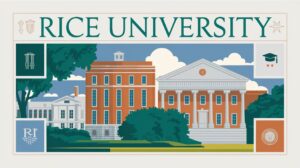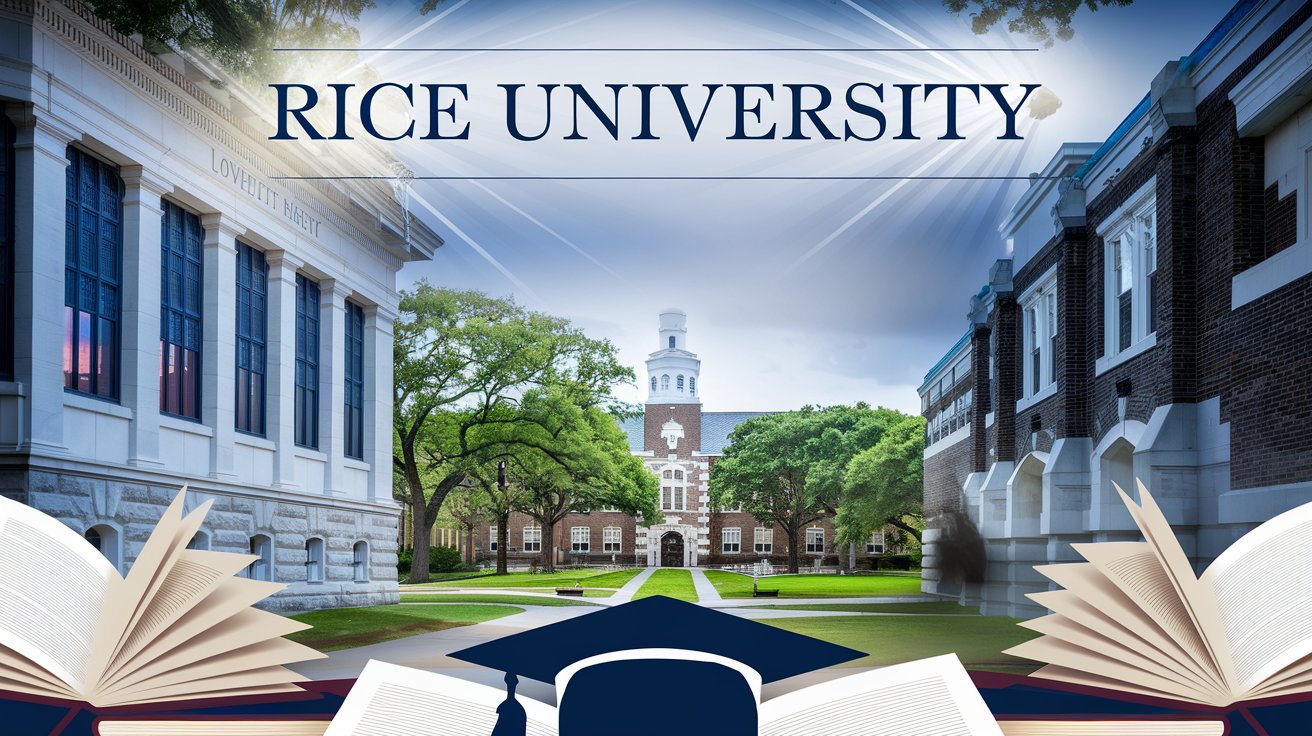Rice University, located in Houston, Texas, is one of the most prestigious and respected institutions in the United States. Known for its rigorous academics, cutting-edge research, and tight-knit community, Rice University has consistently ranked among the top universities in the nation. With a rich history, diverse academic offerings, and a vibrant campus life, Rice University stands out as a leader in higher education. In this comprehensive guide, we will explore everything you need to know about Rice University, from its academic programs and research initiatives to its campus culture and student life.
A Brief History of Rice University
Rice University was founded in 1912 as the William Marsh Rice Institute for the Advancement of Literature, Science, and Art. The university was established through the generosity of William Marsh Rice, a Houston businessman and philanthropist, who left his fortune to create a world-class educational institution. The university officially opened its doors on September 23, 1912, with a small but dedicated faculty and student body.
From its inception, Rice University was committed to academic excellence and innovation. The university quickly gained a reputation for its rigorous curriculum and focus on research. Over the years, Rice has expanded its academic offerings and research initiatives, becoming a leading institution in fields such as engineering, natural sciences, social sciences, and the humanities.
Today, Rice University is home to a diverse and accomplished faculty, a dynamic student body, and a wide range of academic programs that reflect its commitment to excellence in education and research. The university’s motto, “Unconventional Wisdom,” embodies its mission to challenge conventional thinking and foster creativity and innovation.
Academic Excellence at Rice University
Rice University is renowned for its academic rigor and commitment to providing a world-class education. The university offers a wide range of undergraduate, graduate, and professional programs across various disciplines, including engineering, natural sciences, social sciences, humanities, business, and architecture.
Rice’s undergraduate programs are particularly well-regarded, with a strong emphasis on interdisciplinary learning and research opportunities. The university’s small student-to-faculty ratio ensures that students receive personalized attention and mentorship from faculty members. This close-knit academic environment fosters collaboration, intellectual curiosity, and a sense of community among students and faculty.
The George R. Brown School of Engineering is one of Rice’s most prestigious programs, consistently ranked among the top engineering schools in the nation. The school offers undergraduate and graduate degrees in various engineering disciplines, including mechanical, electrical, chemical, civil, and bioengineering. Rice engineers are known for their problem-solving skills, innovative thinking, and commitment to addressing real-world challenges.

Rice’s natural sciences programs are equally renowned, with strong departments in biology, chemistry, physics, and earth science. The university’s dedication to research is evident in its state-of-the-art laboratories and research centers, where students and faculty work together to advance knowledge in fields ranging from nanotechnology to environmental science.
The School of Social Sciences at Rice offers a wide range of programs in disciplines such as economics, psychology, sociology, political science, and anthropology. These programs emphasize the importance of understanding human behavior, societal structures, and public policy. Students in the social sciences are encouraged to engage in research, internships, and community service to gain a deeper understanding of the world around them.
The School of Humanities at Rice offers programs in English, history, philosophy, religious studies, and the arts. The humanities programs at Rice emphasize critical thinking, creativity, and the exploration of cultural and historical contexts. Students in the humanities are encouraged to engage in interdisciplinary research, artistic expression, and community engagement.
The Jones Graduate School of Business at Rice is another standout program, offering MBA, Executive MBA, and Ph.D. programs. The business school is known for its rigorous curriculum, innovative teaching methods, and strong connections with industry leaders. Students at the Jones School have access to a wide range of resources, including mentorship programs, networking events, and opportunities for hands-on experience through internships and consulting projects.
The Rice School of Architecture is one of the oldest and most respected architecture schools in the country. The school offers undergraduate and graduate programs that emphasize design excellence, sustainability, and innovation. Rice architecture students are known for their creativity, technical expertise, and commitment to addressing the challenges of the built environment.
Research and Innovation at Rice University
Rice University is a leader in research and innovation, with a strong commitment to advancing knowledge and solving global challenges. The university’s research initiatives span a wide range of disciplines, from engineering and natural sciences to social sciences, humanities, and business.
One of Rice’s most notable research achievements is its work in nanotechnology. The Richard E. Smalley Institute for Nanoscale Science and Technology is a world leader in nanotechnology research, with a focus on developing new materials, energy solutions, and medical technologies. Rice researchers have made groundbreaking discoveries in areas such as carbon nanotubes, quantum dots, and molecular electronics.
The Rice Quantum Institute is another center of excellence, dedicated to advancing research in quantum physics and quantum computing. The institute brings together physicists, engineers, and computer scientists to explore the fundamental principles of quantum mechanics and develop new technologies that could revolutionize computing, communication, and information security.
Rice’s Center for Theoretical Biological Physics is a leading interdisciplinary research center that brings together biologists, physicists, and engineers to study complex biological systems. The center’s research focuses on understanding the fundamental principles that govern the behavior of living organisms, from the molecular level to the ecosystem level.
In addition to its research centers, Rice University is home to several interdisciplinary institutes and initiatives that promote collaboration and innovation across disciplines. The Kinder Institute for Urban Research focuses on addressing the challenges of urbanization, including housing, transportation, health, and social equity. The Baker Institute for Public Policy is a nonpartisan think tank that conducts research on domestic and international policy issues, including energy, health care, and foreign relations.
Rice’s commitment to research extends to its undergraduate programs, where students are encouraged to engage in research from their first year. The university offers a wide range of research opportunities, including summer internships, independent research projects, and participation in faculty-led research teams. This emphasis on research helps students develop critical thinking skills, gain hands-on experience, and contribute to the advancement of knowledge in their chosen fields.
Campus Life and Student Experience at Rice University
Rice University’s campus is located in the heart of Houston, one of the most dynamic and diverse cities in the United States. The university’s 300-acre campus is known for its beautiful architecture, lush green spaces, and vibrant community atmosphere. The campus is home to a wide range of academic buildings, research centers, residential colleges, and recreational facilities that cater to the needs and interests of students.
One of the most distinctive features of Rice University is its residential college system, which plays a central role in student life. Upon admission, all undergraduate students are assigned to one of 11 residential colleges, where they live, dine, and engage in social and academic activities. The residential colleges are self-governing communities that provide a supportive and inclusive environment for students. The college system fosters a strong sense of belonging and camaraderie, as students build lasting friendships and participate in a wide range of events and traditions.
Rice University’s commitment to diversity and inclusion is reflected in its student body, which represents a wide range of backgrounds, cultures, and perspectives. The university is dedicated to creating a welcoming and inclusive environment where all students can thrive. Rice offers a variety of resources and support services, including cultural centers, counseling services, and academic advising, to ensure that students have the tools they need to succeed.
Extracurricular activities are an integral part of the Rice experience. The university offers over 300 student organizations, including academic clubs, cultural groups, performing arts ensembles, and service organizations. Students can participate in a wide range of activities, from joining a debate team or a theater group to volunteering in the local community. The university also hosts numerous events, such as lectures, concerts, and festivals, that enrich campus life and provide opportunities for students to connect with each other and with the broader community.
Athletics are also a significant part of campus life at Rice. The university’s athletic teams, known as the Rice Owls, compete in NCAA Division I as a member of Conference USA. Rice offers a variety of sports, including football, basketball, baseball, soccer, and volleyball. The university’s athletic facilities include the iconic Rice Stadium, Tudor Fieldhouse, and Reckling Park, where students can cheer on their teams and participate in recreational activities.
Rice University’s location in Houston provides students with access to a wealth of cultural, recreational, and professional opportunities. Houston is the fourth-largest city in the United States and is known for its vibrant arts scene, diverse culinary offerings, and thriving business community. Students can explore world-class museums, attend performances at the Houston Theater District, and enjoy outdoor activities at the city’s many parks and green spaces. Houston’s diverse population and global connections also make it an ideal location for internships, research, and networking.
Alumni and Impact of Rice University
Rice University has a long tradition of producing graduates who go on to make significant contributions to society in a wide range of fields. The university’s alumni include leaders in business, government, science, engineering, the arts, and more. Rice graduates are known for their intellectual curiosity, creativity, and commitment to making a positive impact on the world.
One of Rice’s most notable alumni is Nobel Prize-winning physicist Robert Woodrow Wilson, who, along with Arno Penzias, discovered the cosmic microwave background radiation, providing crucial evidence for the Big Bang theory. Wilson’s groundbreaking work exemplifies Rice’s commitment to advancing knowledge and fostering innovation.
Rice alumni have also made significant contributions to the fields of business and entrepreneurship. John Doerr, a prominent venture capitalist and Rice graduate, has played a key role in funding and supporting some of the most successful technology companies in Silicon Valley, including Google, Amazon, and Twitter. Doerr’s success reflects the entrepreneurial spirit that is cultivated at Rice University.
In the field of public service, Rice alumni have





